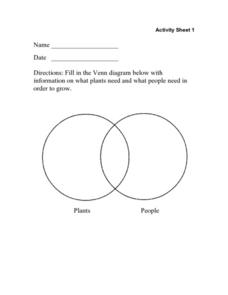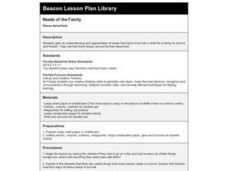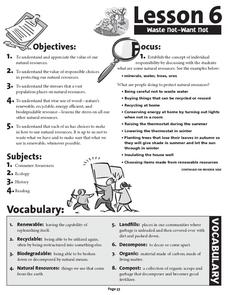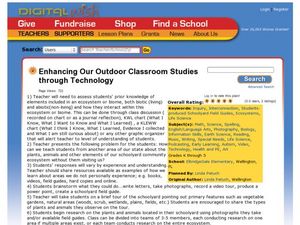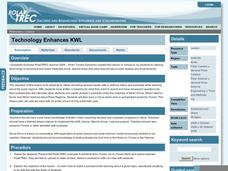Baylor College
Need or Want?
Even as adults it can be hard to distinguish needs from wants. Using pictures of common, everyday items, children make a pocket chart separating the objects they need from those that they want. Discuss their choices, explaining that...
Curated OER
Cloudy with a Chance of Meatballs
Students explore the 5 themes of geography. In this cross curriculum literacy and geography instructional activity, students listen to Cloudy with a Chance of Meatballs by Judi Barrett, and make a list of the needs of the people in...
Curated OER
Plants and People
In this earth science worksheet, students compare plants needs to what people need in order to grow. They complete a Venn Diagram listing the differences as well as the similarities.
Curated OER
Needs of the Family
Students investigate the needs that need to met in order for a family to survive and flourish.
Curated OER
Human Needs
Students investigate human needs and how they have adapted to different environments. They complete an experiment to discover the effect of stress on muscles. They use the food pyramid to create a plan for healthy eating.
Baylor College
Your Energy Needs (BMR)
How many Calories one needs on a daily basis is dependent on a number of factors including gender, height, and activity level. In the third of seven lessons about energy and food, young nutritionists calculate the number of Calories...
Cornell University
Fibers, Dyes, and the Environment
Nanofibers can be made through electrospinning or force spinning in order to reduce the negative impact on the environment. Pupils study the role of fibers and dye on the environment through a series of five hands-on activities. Then,...
Curated OER
Fun with Plants: Plants Help People
For this discovering how plants help people worksheet, students read about ways plants assist us and then make a list of additional ways plants help us. Students write 10 answers.
Captain Planet Foundation
Square Foot Fall Garden
First graders learn the basic needs of plants and identify geometric shapes while planting a fall garden. Combining math and science in one lesson plan, the resource guides kids through starting their class garden as they discover the...
Curated OER
Natural Features as a Resource
Students investigate how land and water can meet basic needs. In this natural resources lesson, students locate water features on a Landscape Picture Map and describe how water is used to meet their needs.
Curated OER
Wanted: Water!
Students determine what percentage of the Earth is water and how much water is needed by humans.
Curated OER
Waste Not Want Not
Students are introduced to the need to save natural resources. Through inquiry, hands-on activities, and problem solving, students increase their understanding of solid waste materials and the need to reduce, recycle, and reuse.
Teach Engineering
Thinking Green!
Encourage your class to solve local environmental issues. Groups brainstorm environmental issues that are affecting the community, choose one they want to solve, and design a product or service to solve their chosen issue. They then...
Messenger Education
Exploring Exploring
The reason people first began trading was because of their desires for objects other societies possessed. In the activity, classes discuss why exploration has been a common thread in all societies and where these desires have taken...
University of Colorado
The Jovian Basketball Hoop
A radio receives radio signals, converts them to an electrical signal, then converts this signal to a sound signal, and amplifies the sound so people can hear it. Class members use this information to create a short-wave radio antenna...
Curated OER
Where is Agriculture?
Pupils study agriculture. In this agriculture lesson, students investigate how agriculture helps to meet a family's needs. Pupils identify things in their home that began as agriculture.
Curated OER
A Trip To the Animal Fair
Students share their experiences they have had with animals. Using photographs of their own pets, they create a booklet out of construction paper in which they identify the pets needs. They also compare and contrast what they need to...
Curated OER
Where'd You Get Those Genes?
Really a unit, this resource exposes middle schoolers to genetics at their level. They read interviews and biographies, trace a family tree, play games that simulate inheritance concepts, and more! Teacher's procedures, student...
Curated OER
Enhancing Our Outdoor Classroom Studies through Technology
Combine science, math, and more using this resource. Learners use technology to share video and other information about their community with people throughout the state. They learn about the environment, identifying native plants, record...
Virginia Department of Education
Weather Patterns and Seasonal Changes
Get your class outside to observe their surroundings with a lesson highlighting weather patterns and seasonal changes. First, learners take a weather walk to survey how the weather affects animals, people, plants, and trees during...
Polar Trec
Technology Enhances KWL
To introduce learners to the ways people share information through the use of technology, the class makes podcasts. Each child chooses anything he is curious about regarding the Arctic or Antarctic regions. Learners then complete a KWL...
Southwestern Medical Center
Field Epidemiology: Investigation of an Unknown Disease
More than 90 percent of the people in a building have come down with an illness, and it is your job to investigate. Teachers give scientists the data needed to decide what is important and how they can solve the mystery. The exercise is...
Polar Trec
Touring the Poles
Would you want to vacation in the Arctic or Antarctic regions? Scholars research both regions and produce a travel brochure trying to convince tourists to visit. The project focuses on the geography, climate, flora, fauna, and indigenous...
Pulitzer Center
Exploring Downstream: Water Resources
The lack of clean water is a life-threatening plight for millions of people around the world. Through an extensive WebQuest, young environment or social studies classes compare our water availability to that of the cxitizens of Ethiopia,...




